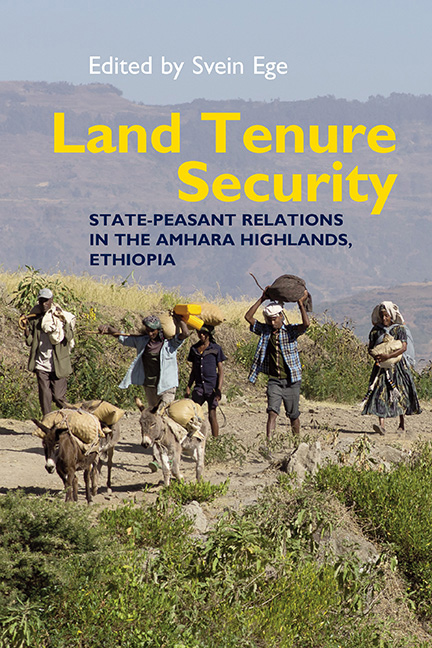Book contents
- Frontmatter
- Dedication
- Contents
- List of Illustrations
- Note on Transliteration
- Dates and Measures
- Contributors
- Preface
- Glossary
- Map
- 1 Introduction
- 2 Peasant Land Tenure: A Critical Review
- 3 The Dersha System: Rethinking Land Tenure under the Därg
- 4 Land Tenure in Gojam under the Därg
- 5 Land Tenure in Baba Säat, North Wälo
- 6 Rich and Poor: Land and Wealth in Mäqét, North Wälo
- 7 Rural Land and Urban Aspirations: Future Orientation in a Time of Change
- 8 An Unstable Land Tenure System
- 9 Conclusion
- Postface
- Select Bibliography
- Index
- Eastern African Studies
7 - Rural Land and Urban Aspirations: Future Orientation in a Time of Change
Published online by Cambridge University Press: 26 March 2019
- Frontmatter
- Dedication
- Contents
- List of Illustrations
- Note on Transliteration
- Dates and Measures
- Contributors
- Preface
- Glossary
- Map
- 1 Introduction
- 2 Peasant Land Tenure: A Critical Review
- 3 The Dersha System: Rethinking Land Tenure under the Därg
- 4 Land Tenure in Gojam under the Därg
- 5 Land Tenure in Baba Säat, North Wälo
- 6 Rich and Poor: Land and Wealth in Mäqét, North Wälo
- 7 Rural Land and Urban Aspirations: Future Orientation in a Time of Change
- 8 An Unstable Land Tenure System
- 9 Conclusion
- Postface
- Select Bibliography
- Index
- Eastern African Studies
Summary
In our exploration of peasant land tenure in the Amhara highlands, we have so far analysed key issues in traditional peasant settings, some of which date back several decades, including the pre-revolutionary and Därg periods. The analysis of (in)equality in Jerelé commune in the previous chapter (Chapter 6) showed a higher degree of differentiation in the little market town of Arbit, when compared to the neighbouring rural wards. The situation in Arbit in many ways mirrors the winds of change which have been blowing across rural and semi-urban communities throughout Ethiopia since the early 2000s, with seemingly increasing speed (see, for instance, Ege 2015 for an account of recent transformations in a community in North Shäwa).
This chapter takes a closer look at the transformations that could be observed in Arbit around 2010, and which had consequences not only for land tenure, but also for the general attitudes towards the future among peasants, traders and officials alike. A series of noticeable changes affected the general conditions for people in this small ‘town’, which in turn opened new and alternative imaginings of the future. In many ways, the fast and profound developments in infrastructure – by which the town literally became connected to a world associated with modernity, through electricity, mobile phones, telephone lines, and a greatly improved highway – people also became ‘connected’ to alternative futures, different from and for many more promising than rural, peasant life. Economic growth and relative peace during the first decade of the new millennium not only boosted the Ethiopian government's ‘will to improve’ (cf. Li 2007), but also stimulated transformative changes (cf. Dwyer and Minnegal 2010: 632).
The developments in the little roadside settlement of Arbit which are treated here took place from about the end of the Eritrean-Ethiopian war (1998–2000) until 2010 (see also Chapter 6). This chapter is based on my acquaintance with the area since October 2000, when I first visited as a member of a small team of researchers on a rather extensive explorative trip to North Wälo. I made several follow-up visits and fieldwork in Jerelé commune in 2002, 2003, 2006 and 2010. The end of the war with Eritrea in 2000 also had significant impact on the topic of this chapter, namely the increased pressure on rural land for nonagricultural purposes, occasioned primarily by demobilized soldiers.
- Type
- Chapter
- Information
- Land Tenure SecurityState-peasant relations in the Amhara Highlands, Ethiopia, pp. 112 - 130Publisher: Boydell & BrewerPrint publication year: 2019



